- California Assembly OKs highest minimum wage in nation
- S. Korea unveils first graphic cigarette warnings
- US joins with South Korea, Japan in bid to deter North Korea
- LPGA golfer Chun In-gee finally back in action
- S. Korea won’t be top seed in final World Cup qualification round
- US men’s soccer misses 2nd straight Olympics
- US back on track in qualifying with 4-0 win over Guatemala
- High-intensity workout injuries spawn cottage industry
- CDC expands range of Zika mosquitoes into parts of Northeast
- Who knew? ‘The Walking Dead’ is helping families connect
S. Korean minister seeks ‘convenient’ timing for Japan trip after Abe’s death
South Korean Foreign Minister Park Jin was rather guarded Monday about the schedule for his widely expected visit to Japan, a potential opportunity for a breakthrough in efforts to mend ties between the neighboring countries, speaking during a press briefing in Seoul.
Some media outlets here and in Japan had reported that he was likely to make his first trip to Japan next week since taking office in May in a bid to explore ways to resolve longstanding disputes between the two sides especially over shared history.
However, the killing of Japan’s former Prime Minister Shinzo Abe last Friday and Sunday’s sweeping election victory of the nation’s conservative ruling coalition may be affecting Park’s plan. Prime Minister Han Duck-soo is scheduled to travel to Japan soon, leading President Yoon Suk-yeol’s special delegation, for an official memorial service for Abe.
Japan’s ruling bloc has stated a push for a controversial revision to the nation’s pacifist constitution, a highly sensitive issue, which may add to political burdens for Seoul’s top diplomat, who was a four-term lawmaker.
“I think we need to keep a close eye on what direction Japan will be headed, going forward,” he said.


South Korean Foreign Minister Park Jin speaks during a press briefing held at the government office complex in Seoul on July 11, 2022. (Yonhap)
The minister stressed that the Yoon administration will keep striving for a “reasonable resolution” to pending issues between Seoul and Tokyo through various related efforts, including his visit to Japan “at a mutually convenient time.”
As the schedule has “not been fixed” yet, relevant consultations will go on in consideration of Japan’s “domestic situations,” Park added shortly after paying respects to Abe at the Japanese Embassy’s public information and cultural center in Seoul.
Park pointed out the urgency of settling the row over compensating the Korean victims of Japan’s forced labor during World War II, when Korea was under its brutal colonial rule.
South Korea’s Supreme Court is expected to issue a final verdict in August or September on whether to allow the liquidation of assets held by two Japanese companies.
If realized, it would deal a serious blow to already fragile efforts to resolve the problem and warm Seoul-Tokyo ties.
On North Korea, meanwhile, Park said the government is working to make North Korea policies into a “single road map” to specify Yoon’s stated pledge for a “bold” approach.
It would include several “incentives” to lead Pyongyang to “step-by-step denuclearization,” the minister said without elaborating.
Realistically, he said, chances are slim that the North will denuclearize itself on its own. Thus, it is necessary to create a circumstance for Pyongyang to choose the path of denuclearization through a “balanced use” of such means as deterrence, sanctions, pressure and dialogue, he emphasized.











